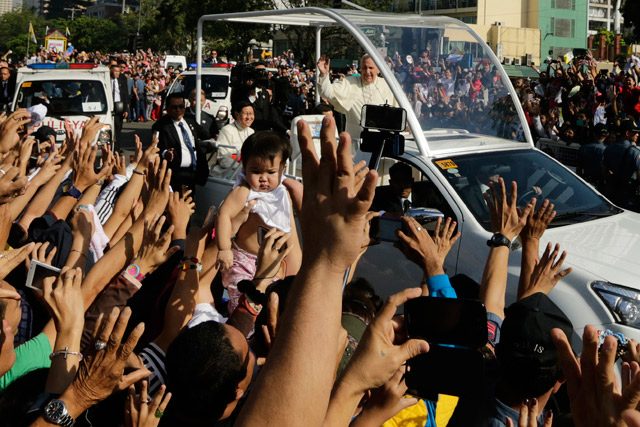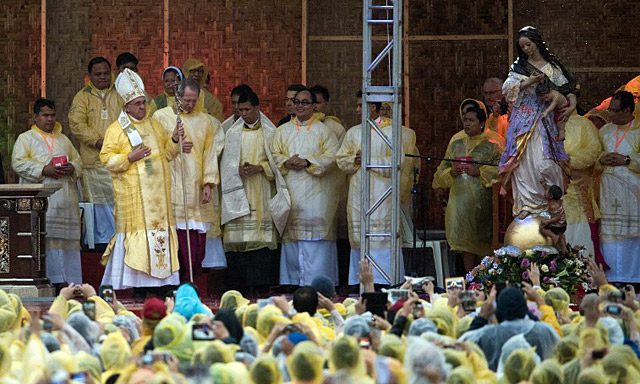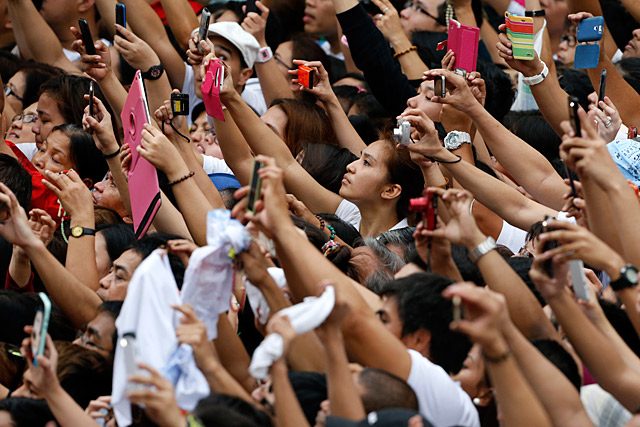SUMMARY
This is AI generated summarization, which may have errors. For context, always refer to the full article.

The Pope has flown off. And just like that, a ray of sunshine has come and gone. So holy was he and so accursed are we, that it was as if the heavens had opened up for the briefest of moments to rain down Hope, with a capital H. We are left, as we often are, wondering why Hope is so short-lived. We wait another day, for a new president or a Pacquiao victory, for Hope’s return.
Yet we could not fail to note the hypocrisy of the Pope’s reception, verging on the Imeldific: the street urchins swept away and locked up in Manila’s jails, in mockery of Christ’s dictum to let the children to come to him. The demolition of a public library in Palo and bunkhouses sheltering victims of Typhoon Haiyan clear space for the Papal parade. The paranoia that prompted authorities to deploy practically an entire region’s security forces – commanded to wear diapers 24/7 – to keep the Bishop of Rome away from the violent, ignorant mobs. Indeed, it was not so much that crime was nil during the papal visit, but that there was no one to report to.
The objective was to cleanse the city of its vagrants, Lazarus’ sores to the State’s self-image.
We have a phrase for this in Filipino: pakitang-tao. The desperation with which our nation’s elites rushed to earn the favor of the Vatican’s head of state was lost on no one. It is in stark contrast to a man who dropped his sacred title to sign “Francis” on the Malacañang guestbook.
Francis came for the poor. He willed to see a church “bruised, hurting, and dirty because it has been out on the streets, rather than a church which is unhealthy from being confined and from clinging to its own security.” He was treated instead to a show of Poverty Lite and a radical disjuncture between his own words and those who welcomed him with the kisses of Judas who have long sold their souls for silver as a matter of course.
Francis, the rockstar Pope?
In the eyes of the 21st century, the Pope is at best a quaint if influential religious figure on the margins of world events, with no real political power. But if Francis has become something of a celebrity, it is because he speaks to the times in a special kind of language.

Lost in diluted narratives about his personal humility is a man whose provocative political statements about the state of the world have earned him the praise of social movements worldwide and direct quotations of Vatican statements by the Philippine Left.
The Pope’s visit to the Philippines coincided with a world in crisis, one that has left not even the most seemingly rigid religious institutions in history unchanged.
So it is with relief that the lapsed Catholics and left-wing Christians among us hear words like, “Learn how to receive with humility, be evangelized by the poor,” and “the world has forgotten how to weep.” It is with relief that we see the leader of an institution that shunned Galileo start taking science seriously, and say we ought to do something about climate change.
It is with relief that we hear the leader of an institution that ordered women burned at the stake for witchcraft, while financing the crusades, say the church ought to open itself up further to interfaith dialogue and religious tolerance, and say it is not in a position to pronounce judgement on the salvation of homosexuals or atheists. It is with relief and joy that we have a leader of a Church, who is technically infallible, say we ought to do something about “unfettered capitalism” and take the side of workers, the poor and dispossessed. In this context, most would be willing to forgive a 78-year-old man’s views on same sex marriage.
While no revolutionary, Pope Francis’ term has heralded a shift from the Church’s traditional focus on sexuality and doctrinal purity to social justice and ecumenism; from the politics of identity to the politics of the real. The reality that is in front of me, he says, while in effect presiding over the redemption of a left-wing Christianity that is still largely a contradiction in terms.
And yet the religious have been saying such naughty things for decades, if not centuries. Consider Isaiah, St Francis (the Pope’s namesake), Muntzer, Gomburza, Martin Luther King Jr, and Cardinal Arns of Sao Paulo (1983): to “subvert means to turn a situation around and look at it from the other side… the side of people who have to die so the system can go on.”
In other words, the System ain’t sacred. Our people are.
Faith is contested terrain
Others, however, insist Francis is too good to be true, and question whether his gestures and words amount to anything more than a clever strategy on the part of the Vatican’s PR team to salvage the Catholic Church’s damaged reputation. In any case, the church could once again retreat to parochial traditionalism with his departure.

In the greater scheme of things, Jorge Mario Bergoglio is one man – albeit to believers, God’s representative on Earth – against an entrenched religious bureaucracy arguably long in bed with the powers of this Earth. Francis has extended his policy of bringing priests to the slums in his native Argentina to a resurrection of liberation theology and a berating of Vatican elites. The mere fact that one of their own has turned against them testifies to the depth of the current crisis, and to the ideological cracks in the facade of the status quo, at least on the religious front.
Yet it would be a mistake to say the Pope speaks for the entire Church, in all its diversity, political contradictions and human frailty. The global political scene is one that has elevated individual figures into symbols of salvation, but deep changes within the church, and beyond it, are not something Francis can accomplish alone.
Perhaps it is time that our own clergy follow suit. The religious scene in this country ranges from a conservative religiosity obsessed with matters of sexuality, ritual, and doctrine to a liberal anti-clericalism otherwise silent on the issues that truly matter: the crime of corruption, the violence of poverty, the obscenity of social inequality.

Long buried beneath both poles is a tradition that has been alive since the days of Martial Law and which for some of us (this author included) was their first introduction to political action.
If religion is opium, it is also a sober respite to those who have found inspiration in the words of the Bible (Exodus and Isaiah in particular), and whose first experiences with being the salt and light of the Earth have been organising in church basements and slums, with priests, nuns, pastors, imams, and a theology professor.
Faith is contested terrain, and there is a need to reclaim the ground we have lost, not to secularism, but to institutions that have perpetuated structures of greed, war, intolerance, and fundamentalist religion.
For believers, reclaim your faith in a God who freed the slaves and calls us to do the same.
What the world needs is an action-oriented faith rooted in community, solidarity, and the prophetic tradition of raining hell on the Herods and Pharisees of our times, in a world bent on tearing us apart from one another. If anything, people like Francis lay bare the reality that there are in fact two gods: one that asks he be crowned in regalia, cloaked in incense and forever in the clouds, identifying with Power, mystifying his people’s suffering, while justifying the poverty of his Kingdom; and another, the one on Earth, actively struggling and fighting with his people, because a people impoverished, ignorant, and enslaved is not one free to worship and enter willingly into his communion.
For non-believers, certainly there is something to be said about the power that brings 6 to 7 million people out on the streets. We must learn from it.
If all else fails, we can hold our ruling classes to account for their hypocrisy, and hold them against the fire of Francis’ own words.
No longer can the religious say: poverty is God’s will. – Rappler.com
CJ Chanco is a policy researcher for Ibon International and a graduate student at the Department of Geography, UP-Diliman.
Add a comment
How does this make you feel?
There are no comments yet. Add your comment to start the conversation.